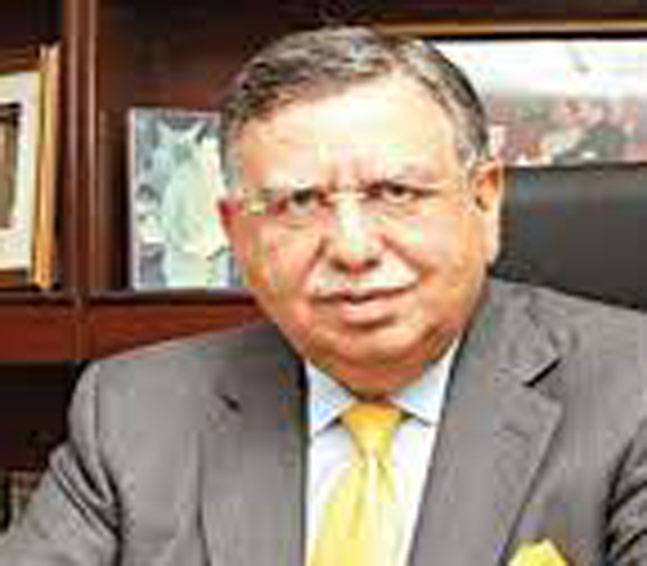Wheat flour price would start declining in next few days
ISLAMABAD - Federal Minister for Finance and Revenue Shaukat Tarin on Tuesday said that government would start giving targeted subsidy on basic food commodities from current month (September), which would cover 35 to 40 percent population of the country.
Addressing a press conference, finance minister said that wheat flour price would start declining in the country in next few days. He noted that the Pakistan’s growth rate is on track keeping in view the increase in revenue collection and imports of the country. He admitted that trade deficit would swell in the months to come. However, he claimed that it would be manageable.
Finance minister did not comment on increasing power tariff from October. “I cannot say whether there will be increase in power tariff from October or not”. Shaukat Tarin hinted for extending the deadline for filing income tax returns. On a question regarding non operational system of Federal Board of Revenue (FBR) for 10 days, he said that he would talk to the FBR about the extension in September 30 deadline for filing the tax returns. Tarin made it clear that sugar price would remain at around Rs103-Rs104 per kg in the country. He said that sugar prices would neither increase to Rs130 per kg nor it could remain at Rs89 per kg. Finance minister once again said that Pakistan would trade in rupee with Afghanistan. He further said that Pakistan would help the neighbouring country.
He announced that government would provide targeted subsidies from this month to the weak segments of society on essential commodities including sugar, flour and pulses. The government would utilize the data of Ehsaas programme for providing cash subsidy on essential food items, which would cover thirty five to forty percent population of the country. He said that inflation has increased due to the expensive import of food commodities from international market. He went on to say that Pakistan is an importer of food items.
Finance minister clarified that the government has not fully passed on the impact of international increase in the prices of commodities to the masses. The increase in international prices during the past couple of years was due to low food production and high demand owing to Covid-19 and supply chain disruption. Sharing details, he explained that sugar prices increased by forty eight percent in the world market but we only icreased its price by eleven percent. Palm oil saw an increase of fifty percent but we increased the price by thirty three to thirty five percent. Similarly, price of wheat enhanced by 32 percent in international market and the government increased its prices by only 15 percent. Likewise, it enhanced the crude oil prices by 9.4 percent in the country as compared to 58 percent in international market. He said that government has cut petroleum levy in order to provide relief to the masses.
Shaukat Tarin said that inflation might increase in future. But, he explained that we have to increase the incomes of the people to enhance their purchasing power. He claimed that incomes would increase soon as tax revenues are increasing and economy is flourishing. The economy is likely to grow at 4.8 to 5 percent in current fiscal year, he added. He said that Kamyab Pakistan Program will be launched this month in order to enable the weak segments of the society earn their livelihoods.
Finance minister informed that country’s net public debt was on declining trend. Net debt to GDP ratio has declined 81.8 percent during the fiscal year 2020-21. Earlier, the net debt to GDP ratio was 85.7 percent in fiscal year 2019-20, and 86.8 percent in 2018-19. However, net debt to GDP ratio was 74.1 percent in FY2018 when incumbent government took charge. Tarin admitted that Pakistan’s total public debt has swelled to Rs39.9 trillion in fiscal year 2020-21, which was Rs25 trillion in 2018 when the government came in power. He said that incumbent government had approached International Monetary Fund (IMF) in 2019, which resulted in increase in interest rate to 13.25 percent and devaluation of rupee from 104 to 167. Hence, this enhanced debt servicing from Rs 1500 billion to Rs 2900 billion instantly, which enhanced the public debt, the minister added. There has been gradual increase in foreign exchange reserves held by the State Bank of Pakistan, he added.
Talking about state owned entities (SOEs), he informed that earning net profit of SOEs were around Rs204 billion which declined to net loss of Rs286 loss in 2018. During 2019, the first year of PTI government, the loss reduced to Rs143 billion. He said that government is working for turnaround of loss making SOEs. The government would establish a board in Privatization Commission, which would consists of world class professionals. The Board would stabilize the SOEs before their privatization.
Finance minister said the government is also focusing on bolstering the agriculture productivity. In the medium to long term, commodity warehouses, cold storages and agri malls will be established with the aim to eliminate the role of middle man and ensure that the farmers get due price of their products. He said strategic reserves of major commodities are also being built in order to ensure smooth supplies in the market.
Finance minister said that government would have to increase the agricultural production. Meanwhile, it would have to take other measures to control inflation including building commodity warehouses, cold-storages so that farmers and purchasers are linked directly without involving middleman. In addition, the government would make scientific engineering process to analyze profits in the supply chain and squeeze role of middleman administratively, he added. The government would also build the strategic reserves of the basic food commodities to flood markets at time of need.






